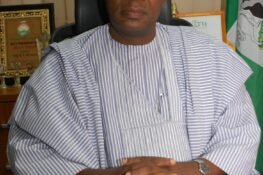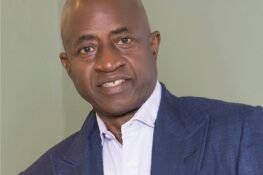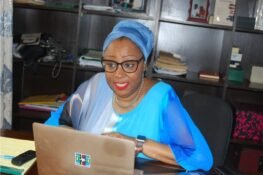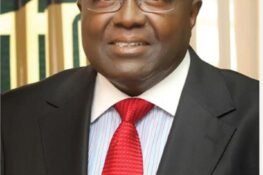The Executive Secretary of the Nigerian Shippers Council, Mr. Hassan Bello, lays out a bold vision to transform Nigeria’s trade and shipping industry.
To the average Nigerian, getting anything through the ports can is a chaotic task. Why is this so?
I think you are talking of the ports of the past. The ports in Nigeria have gone through a transformation, which makes it easier for people to do business. There are challenges that we are facing at the ports, just like in any other sector of the economy. But since the ports were privatized, we have had significant improvements. If you are an exporter, you are likely to face more difficulties. Before this government, we were an import dependent economy, which means we imported everything, from toothpick to toilet paper and from tomatoes to seasonings, and this is not good for the country. Now this administration is revitalizing export. We have to export or we perish. Export is what will make our country responsible. It is what will change our production. A country that does not produce, does not have an economy. So we are now gearing up for this, all over. Every institution is gearing towards developing export. Export in Nigeria has risen astronomically. As a matter of fact, if you look at the 2018 budget, it’s mostly built on non-oil revenue, which means first of all, we are diversifying the economy. We are leaving the era of oil dependence. But most significantly, we are trying to export a lot more. If we do that, we will have the foreign exchange that everybody looks for. We are going to have infrastructure. We are going to have tremendous employment. And as a matter of fact, when laden containers come, right now they leave empty. What we want is for every container that comes to Nigeria fully laden, to also leave fully laden. So, there are significant places to go for information. Nigeria Ports Authority is there. It has been revitalized. There is the Export Promotion Council, a very important institution. The Nigeria Customs Service is also moving forward and making tremendous progress. Then there is also the Nigerian Shippers Council and of course we have the NEXIM Bank. There are many institutions that help in promoting export in all areas; the standardization of export, simplification of the procedures so that the procedures are not only simple but also transparent. Number two, we have to build infrastructure to aid export. I have told you we have been dependent on imports for a long time. So you see that even our ports are not built to receive export. We have enormous resources in Nigeria. Number three is access to finance. We have to have access to market and these are things that will make an export economy. So I think the ports are always in the process of gearing up for export.
You seem confident about building an export economy and you cite the expected rise in non-oil revenue. But are the policies of this government not more focused on taxing consumption rather than generating revenue from export?
That is not true. That is really not true. Incentives for exports are being rolled out everyday. A few weeks ago, NEXIM Bank was given a grant of $500m by the Central Bank for export. They have to build the infrastructure from the farmhouse to the port. We have the Shippers Council’s dry port, which will be a veritable tool for export also because you can export from the dry port. You need not go to the seaport, which means the cost of transportation will be cut down. In the dry ports, there will be consolidation centres; there will storage facilities for temperature sensitive products. There will be a cluster of industries to process all this. If you go to Funtua, to Jos, these are the targets for setting up the dry ports. There are plans for ports in Kaduna, Ibadan, Kano and also in Abia. So the government is not just out to tax consumption; it is creating incentives for export. I have already talked about the rising exports.
Is the Council equipped for the massive public enlightenment that could create a shift in mind-set? Do you have the resources?
Well nobody has enough resources. It’s more about managing what you have. But the Council has been carrying out awareness among importers and exporters first on ethics of the trade. They must import or export transparently. That means there should be no under-declaration. We also abhor concealment of cargo. Since the establishment of the Council in 1978, this has been the concern of the Council, to also look at import/export procedure. We also work with the Ministry of Finance contributing to import/export guidelines so that we simplify the issue. And if you see now, Nigeria is moving up in the World Bank’s Ease of Doing Business index. Substantial progress has been made and we are all working together to make sure we increase the ease of doing business especially exports.
You speak of streamlining the procedures. What about cost because we know that NIMASA sets its own charges, the ports authority does the same, then there’s the Nigerian Custom Service. Does the Shippers Council have any real say in how duties and charges are fixed?
Certainly we do. We benchmarked the NIMASA 3% income they get from ships, for example. Nigeria Shippers Council has the responsibility of negotiating these charges. No one can fix charges without the Nigeria Shippers Council. If you do that, you would be doing it arbitrarily and illegally. So we are looking not only at the ease of doing business but the cost of doing business. And the cost should be reasonable because we are always in competition with other ports in the region. We have to make sure that our tariffs are not extremely high. But there have been some conflicts. Nigeria Shippers Council has had some disagreements with shipping companies, with terminal operators and also with other government regulators over costs. We are trying to say you cannot do certain things unilaterally, arbitrarily and there are other infractions. Some of these matters are in court so I cannot comment on them.
Does the law establishing the Shippers Council give it any real powers to make it effective or does the Council exist just to tick a box in the long list of recommendations made by international bodies?
The law setting up the Nigeria Shippers Council, 1978, that is the Nigeria Shippers Council Act has given it powers to negotiate and set charges. There is also the Nigeria Shippers Council local shipping charges regulations, which were made part I of the Nigeria Shippers Council Act. It singles out the Nigeria Shippers Council as the only organ that will negotiate and fix local shipping charges to the exclusion of any other authority and also to publish these charges. Secondly there are some orders, which we have received when shippers council was appointed as the interim regulator. This regulation has also given the Nigeria Shippers Council enough powers to monitor and enforce standards and also tariffs.
A lot of importers divert their goods to neighboring Benin Republic. Why do you think that is?
It’s an economic issue. It’s the economies of scale. I do not want to use the word diversion because diversion suggests an act illegally done without authority. When you divert something, it is without the authority of the shipper. Primarily, in a freight contract, the shipper, that is the importer has the right to nominate the port he wants his goods or her goods to be taken. So, in making that decision, he has to look at the economic indices and make a choice based on economic criteria. Where will I bring my goods without hassle? How much will it cost from A to B? How many days will my cargo stay in terminal A and how long in terminal B? How much paper work do I do? Some ports, because of procedures, they are tedious and also primitive. Some are fast and automated and therefore easy to get delivery of cargo. Some, the cargo stays in the port for 10 days, in another it’s two days. That is why we are always urging our terminals in Nigeria to be extremely efficient because we are in competition.
When this government first came to power, the government of Benin Republic almost immediately rolled out the red carpet for President Buhari, hoping that he would keep the borders between the two countries wide open and also retain the high tariffs on a class of good like cars. Would the Council support making the duty on this class of goods relatively uniform across West Africa?
Well you are talking about some economic diplomacy, which I think is not out of place. We are always dealing with the ECOWAS Protocol in imports, which I think should be reviewed. The economy of Nigeria is significant in the sense that, even though we have the common ECOWAS external tariff, it is important you look at your economy. There are certain things we may not welcome. In fact, when shippers take their goods to other countries, sometimes it’s not only the cost or ease of doing business, it is because they escape certain rules and regulations. And that is not fair trade. So Nigeria should be very serious about economic consideration, it should influence Nigeria’s diplomacy and its relations with its neighbours.
From Cotonou to Lome, all the way up to Abidjan, businesses are crumbling; government officials and those in the hospitality business are grumbling that Nigerians don’t come anymore. They all blame Buhari’s government. Now, is it the effect of the recession or have the policies of this government made it more difficult to import goods and services from these capitals?
We are paying more attention to our own economy. The Nigerian economy does not exist to please others. We are not exporting employment. We are considering employment of Nigerians first. Because of our previous dependence on imports, we were taking employment to those countries. Now we need to take care of our own employment. We need to take care of our own industries. We need to find markets, not provide a market for other countries. We need to be conscious of our economic terrain first. We were playing Father Christmas; we cannot be Father Christmas anymore.
I have to say you sound a little bit like Donald Trump with his America first mantra. Is that the goal?
No, I do not want to sound like Donald Trump, but yes Nigeria first without the Trump. You can see these policies, how they have helped. It brings respect to this country. It brings some economic development. You have seen the development in the economy. You have seen inflation going down, employment coming up. You have seen the stability in our currency and you see a rise in export. This means that the economy is getting a conscious attention from this government. And we have to ride on that to make the economy right.
There is an argument that it is international trade that builds the world’s economy. And the more trade there is, the better. From where you stand, it’s almost like you want a reduction in trade, every country should look within its own borders. Yet, the European Union has been pushing for the removal of trade barriers within ECOWAS. Their logic is that Africa does not trade enough with itself.
The trade between African countries is abysmally low. It is about 14% compared with 65% or more within the European Union for example or the Americas. We need to trade with one another. But the trade must recognize internal economies. We have to start production. We install governments. Look at what happened in Liberia for example. There was chaos, we brought order, sanity and democracy in Liberia. We did our bit in Sierra Leone. We did our bit in Gambia recently. Yet it was all without any corresponding economic advantages. Why will Liberia for example not buy products from Nigeria? But they could go and import water from India. What I am trying to say is that that free style, that laissez faire of international trade is gone forever. It will never happen again. Nigeria is waking up. It is part of the world economy. It is a member of the World Trade Organisation. It believes in free trade. It believes in the free movement of people within the ECOWAS Protocol. Nigeria Respects ECOWAS and everything but there always comes a time when you have to review things. Things have being going on for a long time. The strength of Nigeria’s economy has effect not only in ECOWAS, but also in the whole world. We need to stabilize our economy in order to encourage trade all over the world.
The Customs Union in the European Union operates seamlessly, because all parties, especially the major economies, play their part. Is Nigeria’s poor leadership not responsible for the failure of ECOWAS and the diversion of goods to places like Cotonou and Lome?
In international trade, there are so many things taken into consideration. The mother of liberalism in international trade is the United States of America. Yet, what is it doing with its steel industry? The steel industry in America is up against the steel industry in China. America has the Jones Act protecting its internal waters against foreign ships just like what we have with the Cabotage Act in Nigeria. They adhere to that strictly. That will give us some parity of reasoning in the economies. What I am trying to say is that, maybe if we review all these things, we could come back stronger.
You are planning a dry port or a number of them. Of what real benefit will it be to the economy?
It will first of all decongest the seaports. It is going to reduce the cost of transportation. It will bring shipping to the doorsteps of those who need it, especially farmers. It will excite and also jump start the economy as far as export is concerned. We do not need to take all our products, travel on bad roads to the seaport. Before we get there, temperature sensitive and agriculture produce would have gone bad, like the Minister of Agriculture told me recently about his yam getting rotten before it got to the UK. If we have the port, a place where products are discharged and loaded; that is the modern definition of a port. It need not be a seaport. So, if we have the dry ports, all the ginger in Kaduna state will be processed, packaged shipped out conveniently reducing wastage and the tediousness of the process.
The dry port in Kaduna appears to be first in line. Why Kaduna?
Kaduna has always been an industrial centre even though right now, the mainstay, which is the textile industry, has closed down. If you remember, in the 70s, we had the Peugeot assembling plant there. Kaduna is somewhere we first had a semblance of a dry port, where goods are examined there and you pay duty there until, for whatever reason, this policy was reversed. What we are trying to do now is bring the port. It will be an incentive not only for industrialization, production but also the processing of abundant resources in agriculture. So Kaduna is a centre and has the vehicle assembly plant there now and we are hoping to use it. It is already in operation actually because goods are being taken to the Kaduna dry port. They are examined there. Customs officials are there but the certain things we still need to do. The Kaduna government has been extremely supportive of this. This is probably because Governor el-Rufai knows about the economic potential of the dry port. He has assisted in no small measure. He is part of it. He goes there sometimes and inspects what is going on there. He is a governor who has the economy running in his veins. We want to finish the administrative buildings of all the agencies. That is including the Customs, other regulators and agencies, police station and some other issues. We are now building the roads because it was not done well. We are looking towards expansion to build more ware houses and a cluster of industries. We will use next year to perfect Kaduna and have it commissioned. Jos is 65% completed. We are still working on the rail side of it. And the importance of Jos, look at all of what is produced in Jos, the mining sector, the agriculture sector. In South Africa, Kwazulu
Natal, there is an export processing zone where flowers are sent to UK. Now from Kwazulu Natal to UK is almost 11 hours. But from Jos to UK is six hours. Nigeria is at the centre of the universe. So geographically, we have an advantage. That is what we want to transform Jos into. The Jos inland port is located very close to the airport. There is a rail line that goes through it. It has everything and we intend to concentrate on that.
It is a massive undertaking. How much will it cost and where is the money coming from?
The money is from the private sector. Government will not spend a kobo except Kaduna state government, which is going to reap benefits from its investment. Even the truck transit park, we have started it with the Kaduna state government and it has gone very far. This is a private sector initiative. The government is just an enabler. The government is a catalyst, if you like and we are providing through the shippers council, all the atmosphere for this to start. The Katsina dry port is also another important landmark because of the cotton and groundnuts. If you go to Katsina now, there is a lot of activity at the dry port; the same thing with ‘Isialonga’. All of the dry ports will be very important in stimulating export and other activities.
How do you plan to go around the lack of basic infrastructure particularly roads and rail lines?
That is a very important question. Already Nigeria is on a revolutionary path of rail system. Rail system is the bedrock of transportation. Transportation drives the economy. Once you have good transportation, you will see the value addition to the economy. Now, Nigeria has a sophisticated rail system. You have seen the rail everywhere and you are now seeing the passenger train from Kaduna to Abuja, which is a beautiful thing. It will be replicated in Kano, in Calabar, in Ibadan. The Ibadan line is even going to affect some bridges in Lagos. So, you see a sophisticated rail system. Government does not joke with the rail system. If we have that, then all other things will be added onto it. Most significantly, all the seaports now will be linked by rail. The gridlock we have in Apapa will never happen again. Apapa depended only on roads. You cannot have one mode of transport linked to the port. For evacuating goods as fast as possible, you have to have the roads, rail, pipelines and inland waterways. Every port, which is going to be built will be linked to the rail lines. The rail lines will link through where the people want goods to be taken and vice versa.
What investments are you making when it comes to the inland waterways?
We have had to sit down with then managing director of Nigeria Inland Waterways. We are looking at the infinite opportunities. Nigeria is one of the most endowed countries in the world. With the resources that are there for us to utilize. The director general of NIMASA came to Nigeria Shippers Council recently and he talked about underwater mining, which could fetch millions of dollars for the country. This is just part of it. Even the oil and gas depends on transportation. If we get our transportation right, we can close all the oil wells, we do not need them.
The dry port is something that cannot be done without coordination with other government agencies, particularly the ports authority, customs service, NIMASA, security agencies, the transport ministry and even the finance ministry. How well are you working together?
Since inception. That is about ten years now. We have an implementation committee that includes all the agencies you mentioned. The ports authority is instructive because it should enable the transition from the seaports to the dry ports. Customs will have to examine the goods there. Also financial institutions, we have to have banks there. What you are calling for is what we have been agitating, the harmony and synergy necessary for seamless transport system. The seaports are not in competition with the dry ports. They complement each other. The goods are not even in transit. The goods are bound for Kaduna Port. So the bill of laden will read Liverpool-Kaduna for example. And if we have the train, for those ships with operating gears, the goods destined to Kaduna will be put on those trains and the trains will just move.
Security is always an issue. What measures are being put in place to ensure containers are not tampered with while on transit?
We have what is called advanced information technology system, what many people call a cargo-tracking note. Nigeria Shippers Council is about to introduce it. It was there before but because of some administrative issues, has not fully taken off. But the moment we have the ICTN, International Cargo Tracking Note, then the tracking of containers will be very easy. The manifest of all that is coming will be transmitted to customs and other organizations even before the ship sails. The effect will be security. Everything that is coming to Nigeria will be known to us and the Customs, so there will be no the issue of smuggling guns. Then there will be no hiding place for people who under declare their cargo to escape custom duty. Somebody said ICTN is the card reader, if you like, of the port industry. Once it is deployed, there will be no hiding place and you will see collection of customs revenue jumping up. The collection agencies like NIMASA, ports authority will go up because it also provides information on the tonnage of the ship, which sometimes is under-declared to escape payment. This is a transparent issue. It is for collection of data. From the data, all our shipment, we will know. When it was deployed for one month or so, we noticed a lot of things. It is also very important for vessel reception, very important for cargo reception so that the clearance of cargo is done even before the ship arrives. So that is the ICTN, which we are going to deploy even in the inland ports. The moment you tamper with a container, electronically, it will be noticed. There will be no need for customs escort. Customs will have everything hooked on their system.
Has there been any assessment done on the impact the dry port will have on the operation and revenue of the Apapa ports?
You are talking only of Apapa. You are also guilty of thinking only of import. It’s vice versa. You use my seaport to bring goods and you use your dry port to send goods. It is a mutually beneficial and symbiotic relationship. I think it is of economic value. It is going to significantly change the way we do business, stimulate exports and create employment. When there is activity of such nature, the local economy will be the first to be impacted on. Soon, you will see open transportation around Kaduna, you will see some factories, all because of the port. We are resolved, with the support of the Kaduna state government to make this thing work. Do not forget, our neighbours to the North are landlocked countries. They very interested in the ports. They can make Kano, Kaduna or Katsina their destination of choice.
Most of our neighbours, right now prefer to use the ports in Togo and Benin Republic for their shipping needs. What favourable terms are you offering them?
Nigerian Ports Authority and Nigerian Shippers Council have worked assiduously to attract cargo from our landlocked neighbors. We have had some measure of success even though I have to say they are isolated attempts for Niger importers to come through Nigeria. We are still working and will work hard so that importers from Niger and Chad will come through Nigeria.
What policy changes would you want the government to make in order to increase our participation in global trade?
I want a change from FOB shipment of, especially crude oil to CFI. We want Nigerians to carry their own petroleum, their own crude oil, based on international standards. I would want to see a partnership between Nigerians and maybe some foreign companies, with Nigerians predominantly holding the larger share. If we are to carry our products, that will also be a revolution. You see us gradually involving our financial institutions, our insurance companies. We will have training our seamen. It will impact our economy positively. I am very happy that for the first time, the ministry of petroleum and NNPC are even giving contracts to indigenous carriers. This has to be encouraged. It is also revolutionary. I also want the Nigerian Transport Commission Bill passed quickly by the Senate. The House of Representatives has already passed that bill, giving the responsibility to the Nigerian Shippers Council. I want that bill to be passed and assented to by the government. That way, there will be a multi-sectoral economic regulator that will coordinate transportation in Nigeria. 90% of goods come through the sea, then go through different modes, maybe by rail, by road, by waterways and sometimes by air. This bill provides for coordination of this interface. So you need a referee, you need a supervisor. You need somebody with a birds eye view of all transportation and economic issues; looking at everything and try make the link and integration. That is building a useful and modern transport infrastructure to improve on the ease of doing business and reduce cost. A modern transport system will push the economy to higher production.
What about when it comes to increasing trade between the countries in Africa, is there anything the government can do?
The government is doing so right now. There what we call sea link, a seven-year program between Nigeria Shippers Council and NEXIM Bank. Luckily it has come to fruition now. NEXIM Bank and other private investors are about to present a kind of regional cabotage. Through ships, we will boost trade. If Ethiopia wants Nigerian onions, what a Nigerian exporter will do is to take a ship to Spain and then from Spain, the onions will be shipped to Ethiopia. We do not have that infrastructure. NEXIM Bank has turned out to be a very progressive bank with the appointment of their new managing director. He understands trade and so we are keying into that.
What would you say has been your biggest success in office?
The success is to be in tune with government’s efforts, to complement government effort and to be conscious of our dear country. To make sure that what is happening in other climes that we are envious of will happen in this country. Nigeria is a country of law. Nigeria is a country of sensible people, very intelligent wherever we go, in high institutions of Europe, wherever it is, Nigerians come first. We want to adopt and have the policy of Nigeria so that Nigeria will be great.
A few years down the road, when you leave office, where do you hope to leave the Council?
The Shippers Council should be that economic entity that is the reference point in shipping. That inevitable, indispensable organ that decides overall, the content of maritime and will push maritime to the highest position where it will make the largest contribution to the economy ahead every other sector.








